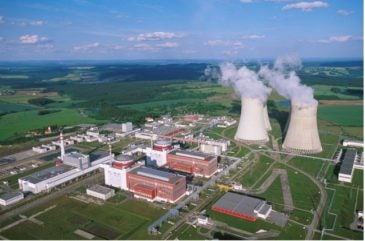
Czech power company ČEZ has concluded a safety contract with the government for the development of small and medium-sized modular reactors. The security agreement will make it possible to ensure the security interests of the state in the selection of a future partner for the development and construction of small modular reactors (SMRs) in the Czech Republic.
According to the Low Carbon Act, it is a necessary document that precedes the actual selection of the supplier. Minister of Industry & Trade Jozef Síkela said: “Our efforts to develop nuclear energy in the Czech Republic are not limited to the successful tender for new units in Dukovany and the preparation of new sources for the Temelín location. Small and medium-sized reactors can be an integral part of the Czech Republic’s future energy mix. They can provide citizens and companies not only with electricity, but also with heat, so they can replace aging coal-fired facilities.”
The contract guarantees that the security interests of the state will be secured, similar to the case for the construction of large nuclear sources. One of the investor’s obligations is to provide the state with information on the selection of an SMR supplier and to enable the state to ensure its security interests through a so-called security requirement.
“The SMR construction programme also means a great opportunity for the Czech economy,” said Sikela “As well as the construction of nuclear facilities it also offers substantial involvement into the supply chain, similar to large units. The contract we concluded with ČEZ will guarantee compliance with the state’s security interests during their development.”
The Czech SMR roadmap, published and approved in 2023, sets out options for technology suppliers and identifies 45 potential sites as well as investor models. Its vision is for SMRs to complement large nuclear units from 2030s-40s onwards.
“Small and medium-sized modular reactors can suitably complement large ones in order to maintain the energy security and self-sufficiency of the Czech Republic,” said ČEZ Board Chairman and CEO. “We assume that new nuclear sources, including modular reactors, will also be significantly represented in the current update of the State Energy Concept, which long-term builds the Czech energy mix in the long term based on a combination of nuclear and renewable sources.”
The first modular reactor is planned to be sited near the Temelín NPP in South Bohemia. ČEZ is working closely with the South Bohemian Region and its subsidiary ÚJV Řež for its preparation. ČEZ is also looking at other locations for a second and third SMRs. The power plants in Dětmarovice and Tušimice are being considered and are now undergoing a series of investigations to check their suitability.
Four VVER-440 units are currently in operation at the Dukovany NPP, which began operating between 1985 and 1987. Two VVER-1000 units are in operation at Temelín, which began operation in 2000 and 2002. The Dukovany units will be decommissioned no later than 2045-2047. Nuclear currently provides about one-third of the Czech Republic’s electricity.
In July a South Korean consortium led by the state-run Korea Hydro & Nuclear Power (KHNP) was selected as the preferred bidder for the construction of up to four new NPP units in the Czech Republic. The other contender was France’s EDF. US-based Westinghouse Electric had been excluded from the tender in January, because it “did not meet the necessary conditions”.
However, Westinghouse is in a long-standing legal dispute with KHNP over intellectual property rights, which is the subject of international arbitration that is unlikely to conclude before late 2025.
According to the Czech Office for the Protection of Competition (UOHS – Úřad pro ochranu hospodářské soutěže) both Westinghouse and EDF have asked for a review of the tender process. UOHS says it is “currently familiarising itself with the content of both proposals”.






